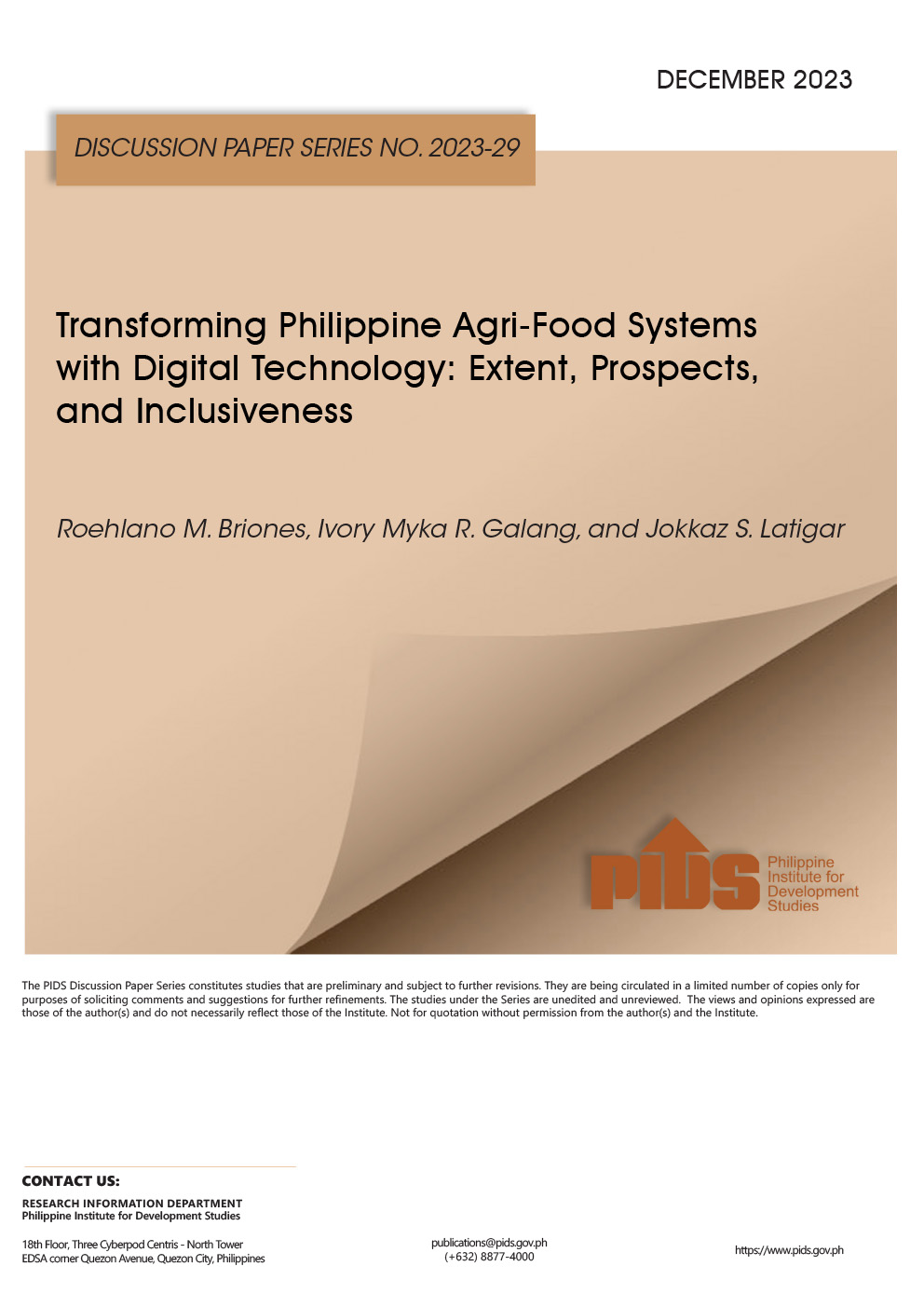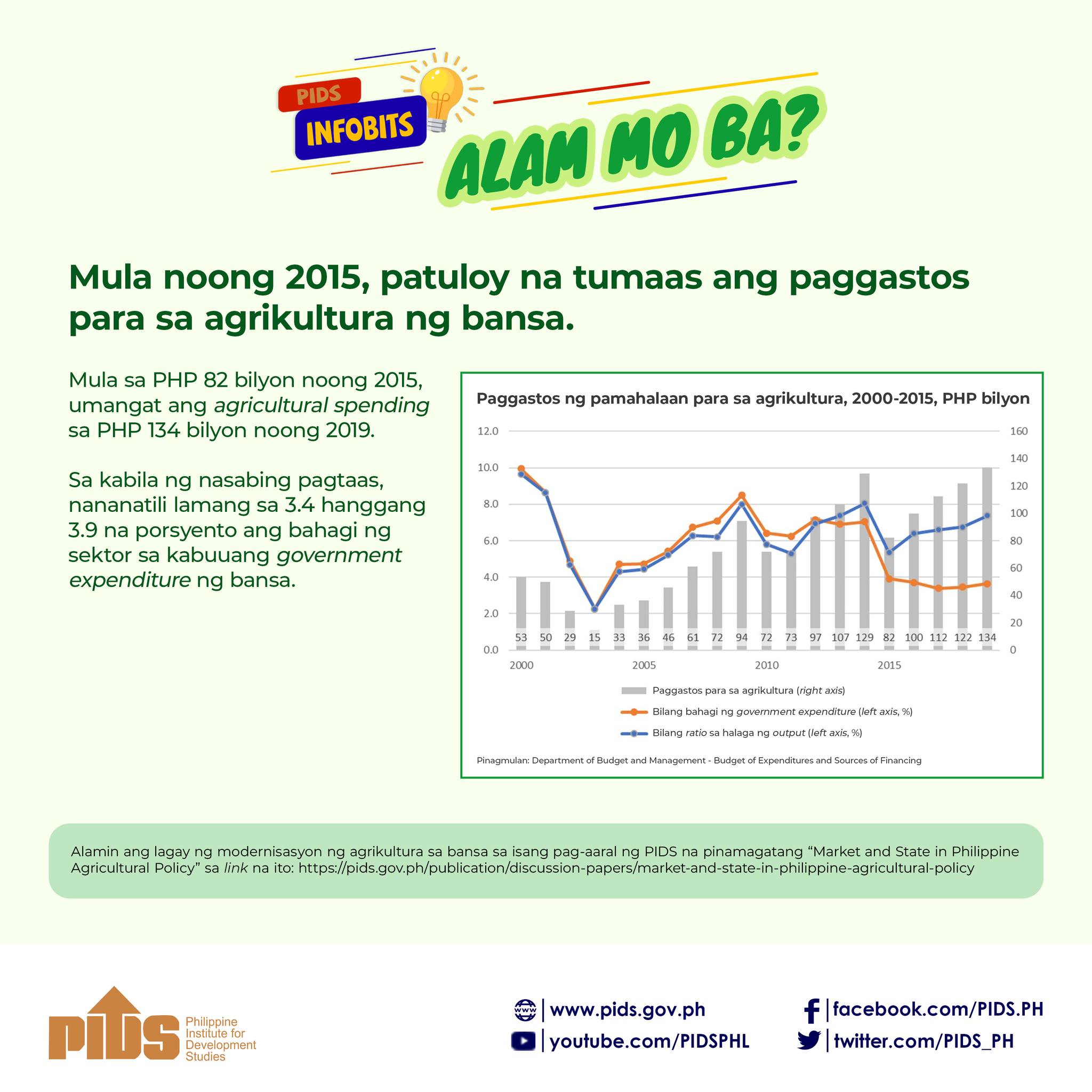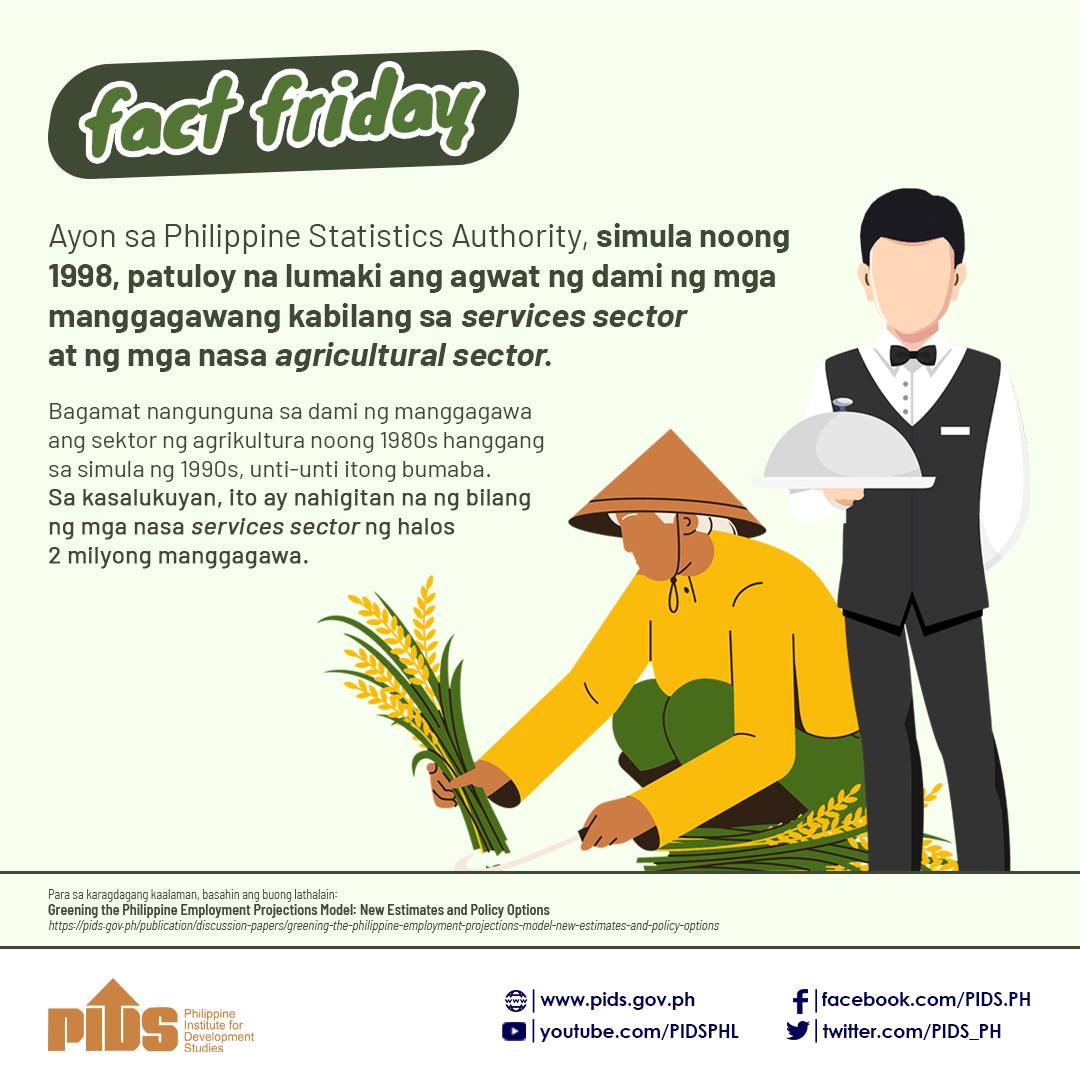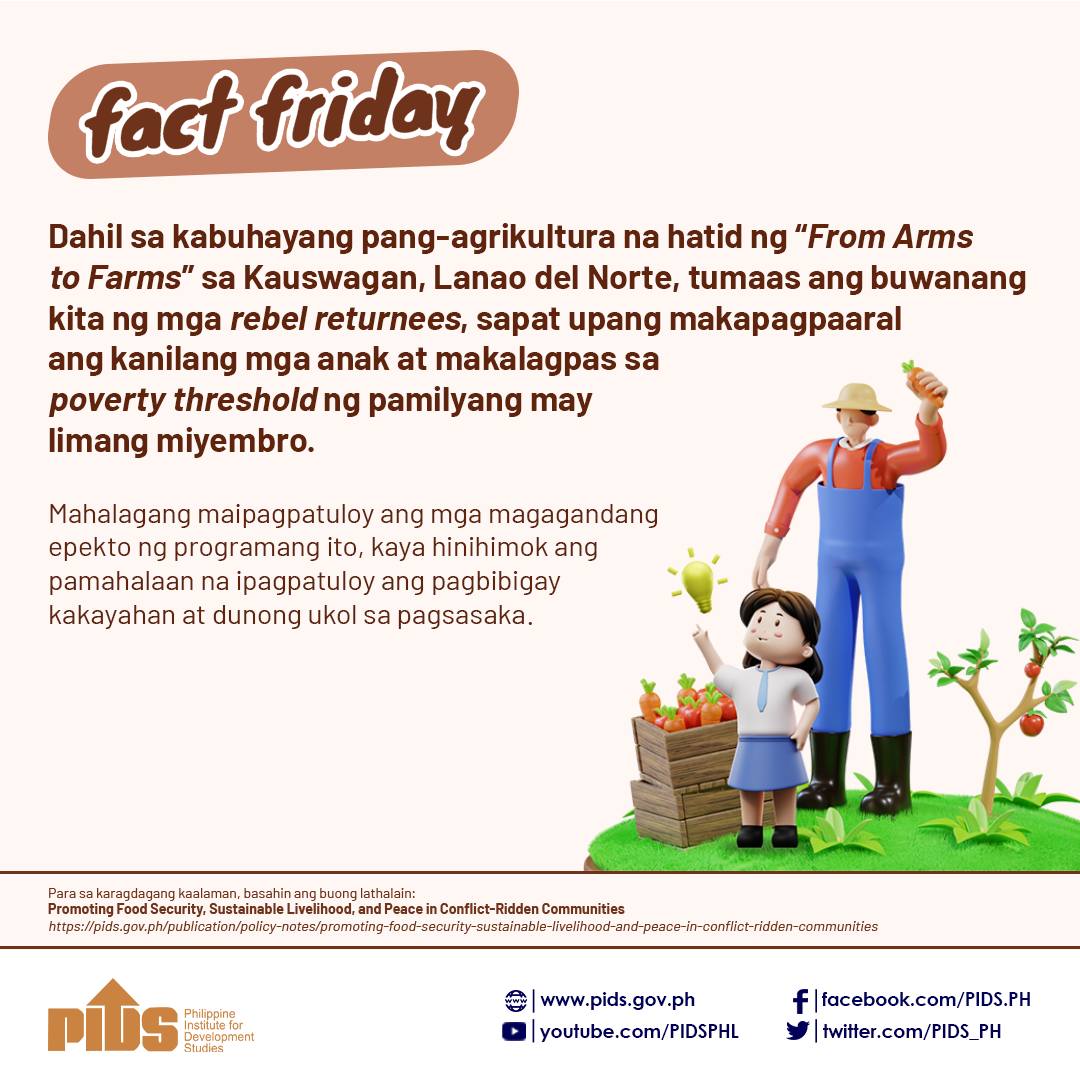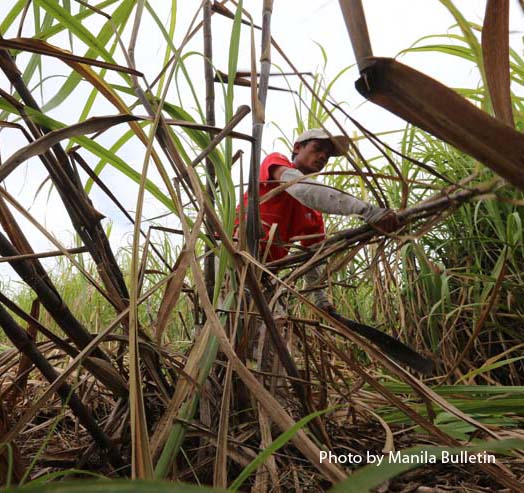
The Agribusiness Venture Arrangements (AVAs) and Sugarcane Block Farming (SBF), two government initiatives aimed at boosting farm productivity and income of agrarian reform beneficiaries (ARBs), should be encouraged.
According to a study by state think tank Philippine Institute for Development Studies (PIDS), AVAs and SBF can be successful as long as adequate government support is given to ARBs from the farm production stage to marketing and postproduction activities. Likewise, government must provide a policy environment for Philippine exports crops to be competitive.
Three of the country’s biggest export crops—banana, pineapple, and sugarcane—have been covered under the Comprehensive Agrarian Reform Program (CARP). Through AVAs, ARBs who were awarded with lands planted with high-value crops such as banana and pineapple can implement an agribusiness venture with private investors to make farming more economically viable for them. Meanwhile, sugarcane farmers owning farms that are 10 hectares or less can set up cooperatives or organizations through SBF to consolidate their operations and attain economies of scale.
Recently, however, AVAs and SBF have been the subject of increasing scrutiny following reports that ARBs have not been successful in their partnerships with private investors as shown in a 2016 study of the United Nations Food and Agriculture Organization. These have prompted lawmakers in both houses of Congress to propose legislations to review the AVAs and change some of the provisions governing how they are implemented.
“While it is true that many farmers have entered into one-sided contracts, there are also existing arrangements which have benefited the farmers as indicated,” the authors of the PIDS study maintained. Thus, they suggested that it may be worthwhile to look into the conditions of the successful AVAs that can be inputted in the proposed bills.
Meanwhile, to strengthen the implementation of AVAs and SBF, the authors noted that the persistent problems faced by ARBs need to be resolved.
First, they noted that farmers or cooperatives should have security of tenure over the land awarded to them so that they can partner with private investors. They added that “labor, farm machinery, and irrigation should also be available and accessible to them.”
Provision of credit is another necessity highlighted by the PIDS study. It cautioned that unless capital is provided, individual farmers will always be tempted to go into a lease agreement without thinking of its consequences.
“Financial assistance is needed by the farmer to ensure that recommended inputs are applied. If government cannot provide the needed capital, it should look into the possibility of providing subsidized inputs to farmers or cooperatives,” the study suggested.
Since banana, pineapple, and sugarcane are export crops, the government does not have control over their prices. However, the study pointed out that the government can provide the necessary policy support such as pushing for lower tariffs for banana and pineapple. Doing so can potentially increase the country’s share in the global market for these high-value crops, which, in turn, will benefit local farmers.
For the SBF to be successful, the PIDS study recommended that the Department of Agrarian Reform must sustain the support services being given to the ARBs. Likewise, it urged government to lobby for the imposition of a quota on corn syrup after 2018 to ensure that the local demand for sugar will increase.
“Corn syrup, which is from China, was identified as a sugar substitute only in 2017 and therefore, an importation quota has not yet been set. This reduced the demand for sugar by soft drinks companies, which, in turn, led to a decline in sugar prices,” the authors explained.
Finally, they cautioned that creating a new government entity that would address the needs of the banana and pineapple industry is costly and tedious. According to them, it may be more practical and feasible for the Department of Agriculture or the Department of Trade and Industry to create a section within its organization that will look into the concerns of the two industries. ###
This press release is based on a PIDS Discussion Paper titled “Assessment of Agribusiness Venture Arrangements and Sugarcane Block Farming for the Modernization of Agriculture”.
According to a study by state think tank Philippine Institute for Development Studies (PIDS), AVAs and SBF can be successful as long as adequate government support is given to ARBs from the farm production stage to marketing and postproduction activities. Likewise, government must provide a policy environment for Philippine exports crops to be competitive.
Three of the country’s biggest export crops—banana, pineapple, and sugarcane—have been covered under the Comprehensive Agrarian Reform Program (CARP). Through AVAs, ARBs who were awarded with lands planted with high-value crops such as banana and pineapple can implement an agribusiness venture with private investors to make farming more economically viable for them. Meanwhile, sugarcane farmers owning farms that are 10 hectares or less can set up cooperatives or organizations through SBF to consolidate their operations and attain economies of scale.
Recently, however, AVAs and SBF have been the subject of increasing scrutiny following reports that ARBs have not been successful in their partnerships with private investors as shown in a 2016 study of the United Nations Food and Agriculture Organization. These have prompted lawmakers in both houses of Congress to propose legislations to review the AVAs and change some of the provisions governing how they are implemented.
“While it is true that many farmers have entered into one-sided contracts, there are also existing arrangements which have benefited the farmers as indicated,” the authors of the PIDS study maintained. Thus, they suggested that it may be worthwhile to look into the conditions of the successful AVAs that can be inputted in the proposed bills.
Meanwhile, to strengthen the implementation of AVAs and SBF, the authors noted that the persistent problems faced by ARBs need to be resolved.
First, they noted that farmers or cooperatives should have security of tenure over the land awarded to them so that they can partner with private investors. They added that “labor, farm machinery, and irrigation should also be available and accessible to them.”
Provision of credit is another necessity highlighted by the PIDS study. It cautioned that unless capital is provided, individual farmers will always be tempted to go into a lease agreement without thinking of its consequences.
“Financial assistance is needed by the farmer to ensure that recommended inputs are applied. If government cannot provide the needed capital, it should look into the possibility of providing subsidized inputs to farmers or cooperatives,” the study suggested.
Since banana, pineapple, and sugarcane are export crops, the government does not have control over their prices. However, the study pointed out that the government can provide the necessary policy support such as pushing for lower tariffs for banana and pineapple. Doing so can potentially increase the country’s share in the global market for these high-value crops, which, in turn, will benefit local farmers.
For the SBF to be successful, the PIDS study recommended that the Department of Agrarian Reform must sustain the support services being given to the ARBs. Likewise, it urged government to lobby for the imposition of a quota on corn syrup after 2018 to ensure that the local demand for sugar will increase.
“Corn syrup, which is from China, was identified as a sugar substitute only in 2017 and therefore, an importation quota has not yet been set. This reduced the demand for sugar by soft drinks companies, which, in turn, led to a decline in sugar prices,” the authors explained.
Finally, they cautioned that creating a new government entity that would address the needs of the banana and pineapple industry is costly and tedious. According to them, it may be more practical and feasible for the Department of Agriculture or the Department of Trade and Industry to create a section within its organization that will look into the concerns of the two industries. ###
This press release is based on a PIDS Discussion Paper titled “Assessment of Agribusiness Venture Arrangements and Sugarcane Block Farming for the Modernization of Agriculture”.

